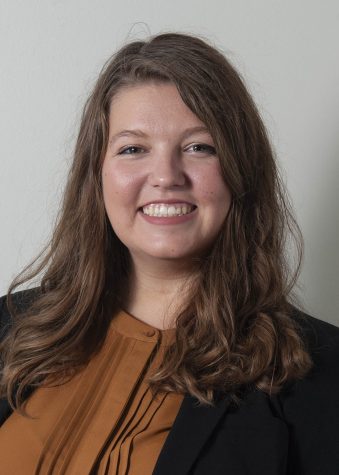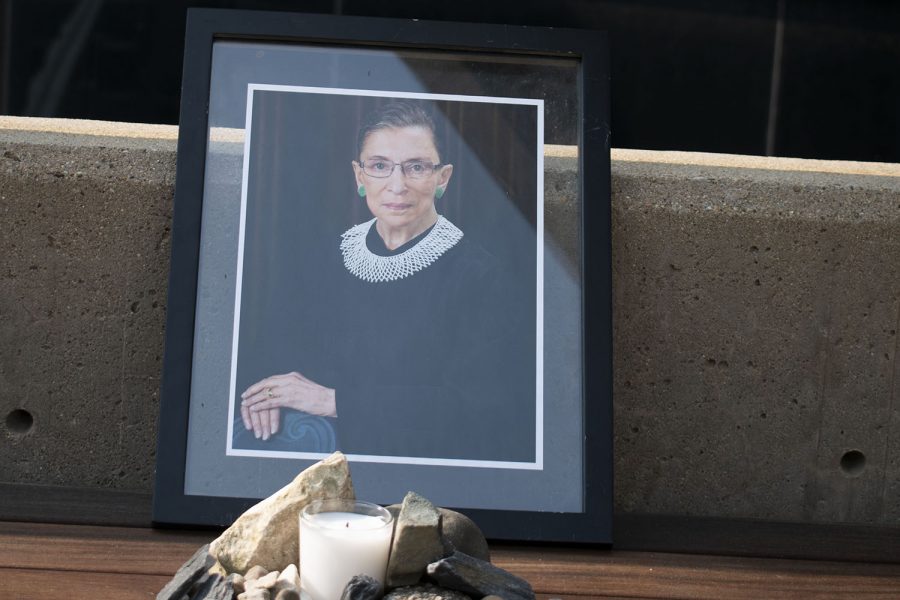Women of the UI law school mourn RBG, reflect on gender identity
Women at the University of Iowa law school, both students and professors, reflect on how their identity as a woman affects their place in the legal world in the wake of Ruth Bader Ginsburg’s death.
A memorial for Ruth Bader Ginsburg is seen outside the University of Iowa’s College of Law building on Monday, Sept. 21, 2020. Ginsburg passed away Friday, Sept. 18, 2020.
September 22, 2020
University of Iowa law student Kayla Boyd said the passing of U.S. Supreme Court Justice Ruth Bader Ginsburg means the passing of a strong, powerful female attorney and judge, and one of the few women icons that exist in the legal world.
“Everybody wants to have a role model to look up to that looks like them, but for lawyers, all of the typical role models that you hear about are men,” Boyd said. “Her confidence and ability to navigate a male-dominated profession is truly amazing.”
Ginsburg died on Sept. 18 of complications from her long battle with pancreatic cancer. Ginsburg was the second female justice to serve on the U.S. Supreme Court and was an outspoken advocate for women’s rights, ruling mostly on the liberal side of cases.

Boyd, a 24-year-old Colorado native, said while there are more female attorneys in the profession than there have been in the past, some of her male colleagues will often talk over her or other women, and express a certain kind of self-confidence that makes some women feel timid.
“I have tried to do the opposite of being timid or being self-conscious about being a female attorney, and I am now more than ever pretty dedicated to showing how female attorneys are in the courtroom,” Boyd said. “So, I engage in all the activities I can to show that female attorneys are strong and powerful in the sense that we belong here, but I cannot say that it’s always been easy.”
UI Clinical Associate Professor of Law Alison Guernsey has been practicing law as a federal public defender since 2010 and said she constantly has to think about how she’s presenting herself in a courtroom. She said you can’t teach professionalism without talking about gender identity, because unfortunately, many stereotypes of women coming across as mean or abrasive still exist.
Guernsey said she’s been referred to as a paralegal and a student while in a courtroom, and that she’s had jurors comment on the shoes she was wearing while defending a case.
“And these are things that I don’t think would necessarily happen to men,” Guernsey said. “Although one would hope that it would get better with time, I don’t think we’ve reached a critical mass of women in the legal profession, such that our default as to what it means to be a trial lawyer has started to change.”
She said she felt a deep sadness when learning about Ginsburg’s death, because she said the former justice really embodied what it meant to use a position of power for the greater good of people.
“What has been striking to me is that despite the fact that my law students are a number of years younger than I am at this point, [RBG] still really makes the same impression on the younger generation of students … as she did on me,” Guernsey said. “She was a huge motivator for students.”
According to a 2018 report from the U.S. Census Bureau, more than one in three lawyers are women, but men still have some of the highest salaries. At mid-career, the top 10 percent of women lawyers earn about $300,000 a year, while the top 10 percent of male lawyers make about $500,000 a year.
RELATED: UI professors teach on Ruth Bader Ginsburg’s legacy and future of the Supreme Court
A 2018 report from Vault and the Minority Corporate Counsel Association found that, out of the 232 law firms they surveyed, only 9 percent of attorneys were women of color, and only 2 percent of attorneys were Black women.
Adrien Wing, associate dean for international and comparative law programs at the UI, wrote in an email to The Daily Iowan that she identified more with her race than gender while studying law at Stanford University in 1979. She said there were very few female students and even fewer Black female students and only one Black faculty member.
Wing said she experienced sexual harassment in many of her jobs at various organizations.
“Speaking with almost 40 years’ experience, I can tell you that women have faced and will continue to face problems that most men do not,” Wing wrote. “These include proper handling of leave for pregnancy and initial childcare as there is still no paid maternity leave as a national policy in the United States.”
Wing said she spent three days with Ginsburg in Paris in 2013 while Ginsburg was teaching at Tulane Law School’s summer program, and Wing was an inspector of that program for the American Bar Association.

Wing said that Ginsburg told her, “You know Adrien, there are people that want me to retire, but I won’t.” Wing said Ginsburg said it with such force and strength, and that it was a really powerful moment.
UI law student Emily Lavery, 23, co-president of the Iowa Student Bar Association, said she was shocked to learn about Ginsburg’s death because “she seemed like an unstoppable force.”
Lavery said that while she has experienced instances of microaggressions such as being mansplained to or having to abide by an unspoken dress code, she feels respected and appreciated as a woman leader in the law school.
“I think there’s always room for more women in leadership roles, especially women of color, but I also love how many women are so involved in the law school,” Lavery said. “It’s awesome to have peers who are my friends and who are strong women doing really cool things — it’s a really strong bond. And I do think it makes [the school] more inclusive and to know that we can all do this.”
Lavery, along with other female law students and staff, expressed concern over the possibility that President Trump and the Republican-majority U.S. Senate could potentially fast-track a nomination process for a Trump-appointed justice.
A Trump nominee could potentially turn the tables against rulings dealing with women’s reproductive rights, the constitutionality of the Affordable Care Act, and the rights of undocumented immigrants.
Hannah McDevitt, co-president to Lavery of the Iowa Student Bar Association, said it’s encouraging that Trump said he plans to nominate a woman, and that it’s hard to predict what the impacts of a new justice could be.
She said something particularly inspiring to her about Ginsburg was her ability to balance the roles of being an attorney, a wife, a mother, and then ultimately a judge on the nation’s highest court. McDevitt added that she’s grateful for the opportunities available for women in law today that weren’t as accessible 50 years ago.
“My identity as a woman definitely affects the lens through which I see the world, just like any other personal characteristic does,” McDevitt said. “But that identity doesn’t affect the way in which we’re called to objectively analyze the law.”
UI third-year law student Chandler Mores, 25, said she’s “terrified” of how a Trump nominee could potentially rule on many human rights issues, and that she thinks the Senate should uphold what they did in 2016 when they blocked former President Barack Obama’s Supreme Court nominee after the passing of justice Antonin Scalia.
Mores said as a woman law student and having to read about cases that stripped women and minorities of some rights take a toll on your emotional and mental health.
“If you look at the recent Supreme Court decisions and how close those decisions were … [the case] about LGBTQ people and how they cannot be discriminated against in the workplace, and the DACA case, the citizenship question, gay marriage — all of those were close decisions,” said Mores, senior managing editor of the Iowa law Review.
Mores said she’s worked alongside women attorneys who have been referred to as “secretary” or been called names like “honey” by men in the office. Mores said she’s experienced more indirect gender discrimination, like being characterized behind her back as a “bitch” or as being “too assertive” when arguing about something she’s passionate about.
“The female professors that I’ve taken classes from,” Mores said, “they’re women that I really admire, they’re my role models and my mentors, and I’m forever grateful for what they’ve taught me both in the classroom and outside.”















